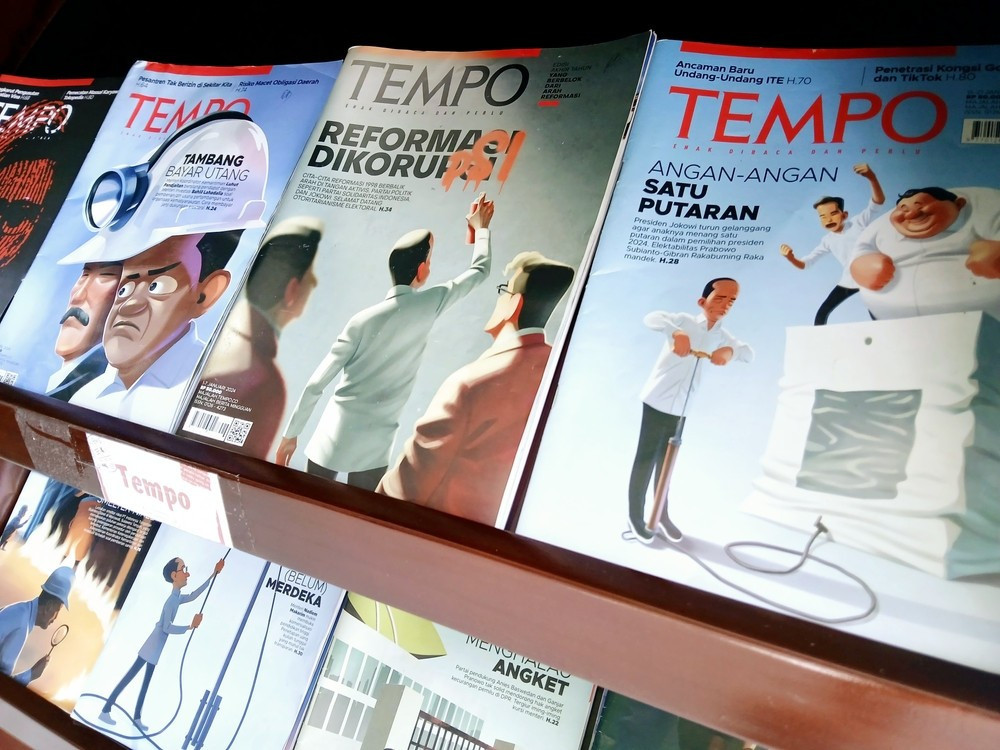News
Civic space shrinks further with arrests of activists and threats on Tempo
Tenggara Strategics September 24, 2025 Well-known voice: Editions of 'Tempo' magazine are seen on a bookshelf on Oct. 6, 2024, in this illustration photo. (Shutterstock/landunggrafis)
Well-known voice: Editions of 'Tempo' magazine are seen on a bookshelf on Oct. 6, 2024, in this illustration photo. (Shutterstock/landunggrafis)
In the aftermath of the August anti-government riots, police have arrested more than 10 activists and social media influencers, charging them with incitement, hate speech, and spreading misinformation that led to violence and encouraged schoolchildren to participate.
The military also got in on the act, filing a defamation complaint against a prominent influencer, while the Defense Ministry filed a similar report against Tempo. The critical news outlet also faces a Rp 200 billion ($12 million) lawsuit from a cabinet minister for defamation.
Civil society groups say the government is suppressing speech, both online and offline, through these actions and through the arrests of hundreds of protesters in Jakarta and other cities where riots broke out. They say police are singling out activists and influencers who were critical during the riots that took place on August 28-30.
The release of protesters and the ending of police attempts to criminalize them is listed as one of the “17 + 8 People’s Demands”, a document compiling the grievances that emerged from the series of protests. The document has become a point of reference for discussion between protesters, represented by public figures, students, and civil society groups, and the government.
President Prabowo Subianto has described these 25 demands as reasonable and promised to look into them. The House of Representatives has acted on some of these demands, including rolling back the huge housing allowance it gave members and suspending five members for statements and actions said to have offended the public.
But when it comes to speech restrictions, Prabowo’s office gave the answer that the government can not interfere with an ongoing legal process, and that the matter should be resolved in court.
Civil society groups see the police's actions more as vengeance after some of their officers were seen engaging in brutality on social media. The turning point of the protests was a live-streamed video, which quickly went viral, of a motorcycle taxi (ojol) driver being fatally run over by a police tactical vehicle on Aug. 28. This triggered even more protests the next day. Seven police officers who were in the tactical vehicle have been suspended.
Police say they have evidence of the offending social media postings that led to the activists’ arrest.
Some attempts have been made at preventing the cases from going to court, but police say some of the posts were in blatant violation of the law.
In one case, a staff member of an international institution in Jakarta posted on her Instagram telling protesters to burn down the National Police headquarters, while in another, a man called protesters to burn down Jakarta’s Soekarno-Hatta airport. Others were charged with directing people to attack and loot the residences of House members.
One prominent influencer, Delpedro Marhaen, the founding director of Lokataru Foundation, championing human rights, was among the first arrested. Police say he spread false information and incited schoolchildren to join in the protests “to fight together” in his postings.
To their credit, police rejected a defamation complaint from the Indonesian Military (TNI) against prominent influencer Ferry Irwandi, saying the law allows only individuals and not institutions to file a defamation complaint. Ferry, who posted that the government was about to impose martial law, has been defiant and looked forward to facing the military in court after the complaint was made. This will no longer occur as Ferry and the TNI resolved their dispute amicably.
The Defense Ministry, however, is pressing its case against Tempo also for alleging imminent martial law, although not with the police but rather with the Press Council, which arbitrates disputes with news publishers.
But Tempo has learned that an arbitration settlement is no guarantee that the case will not go to court. The magazine has been slapped with a Rp 200 billion lawsuit from Agriculture Minister Amran Sulaiman in spite of it already complying with the Press Council’s resolution to apologize for its report about the condition of rice distributed by the government. The council ordered to change the phrase “rotten rice” to a less offensive term.
The Legal Aid Institute for the Press (LBH Pers) says the lawsuit against Tempo is a threat to press freedom.
What we've heard
The TNI initially consulted with the Jakarta Police regarding defamation against the military allegedly committed by pro-democracy activists during recent demonstrations. The consultation was prompted by the TNI’s discovery of the suspected crime through cyber patrols.

